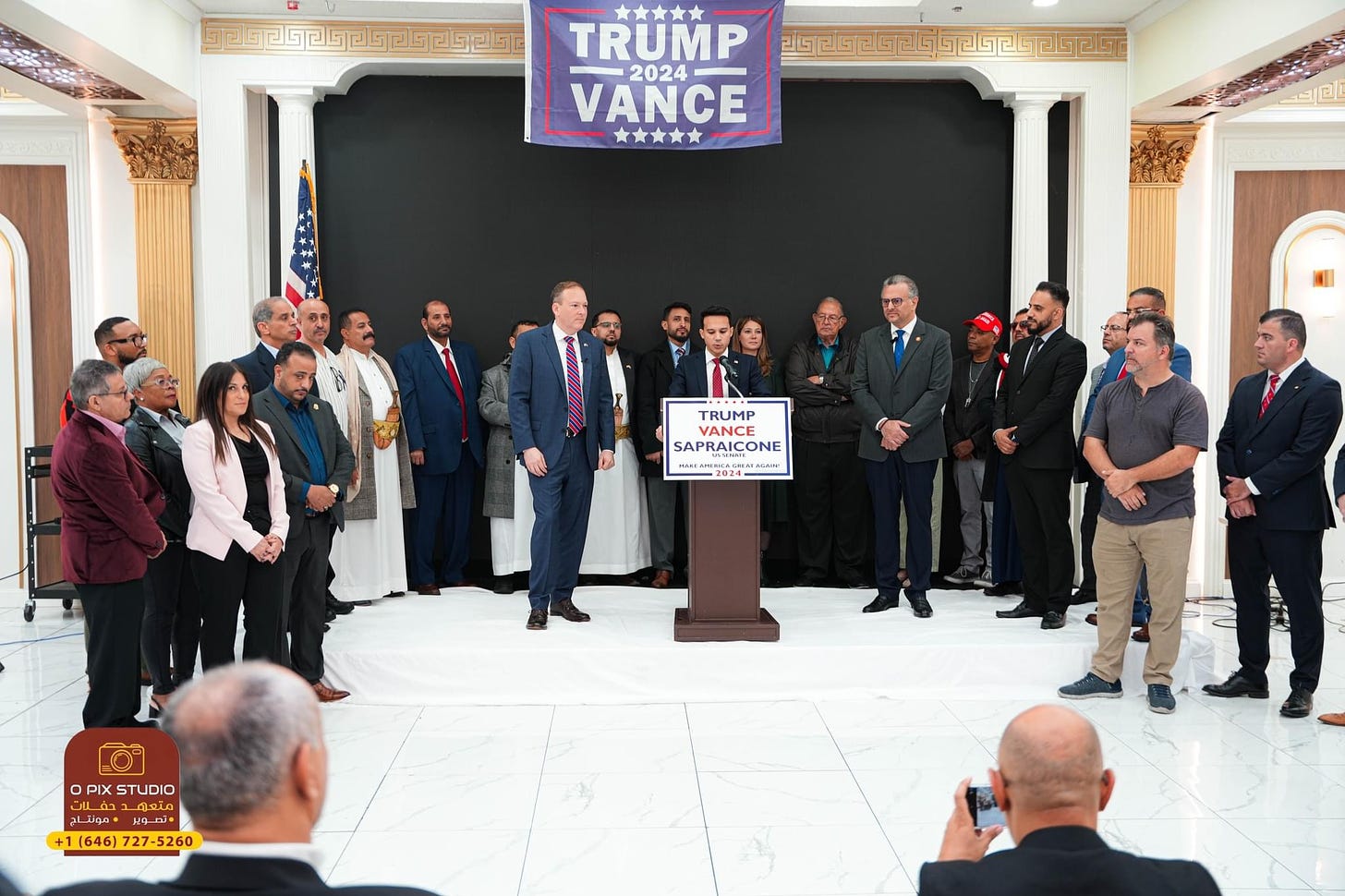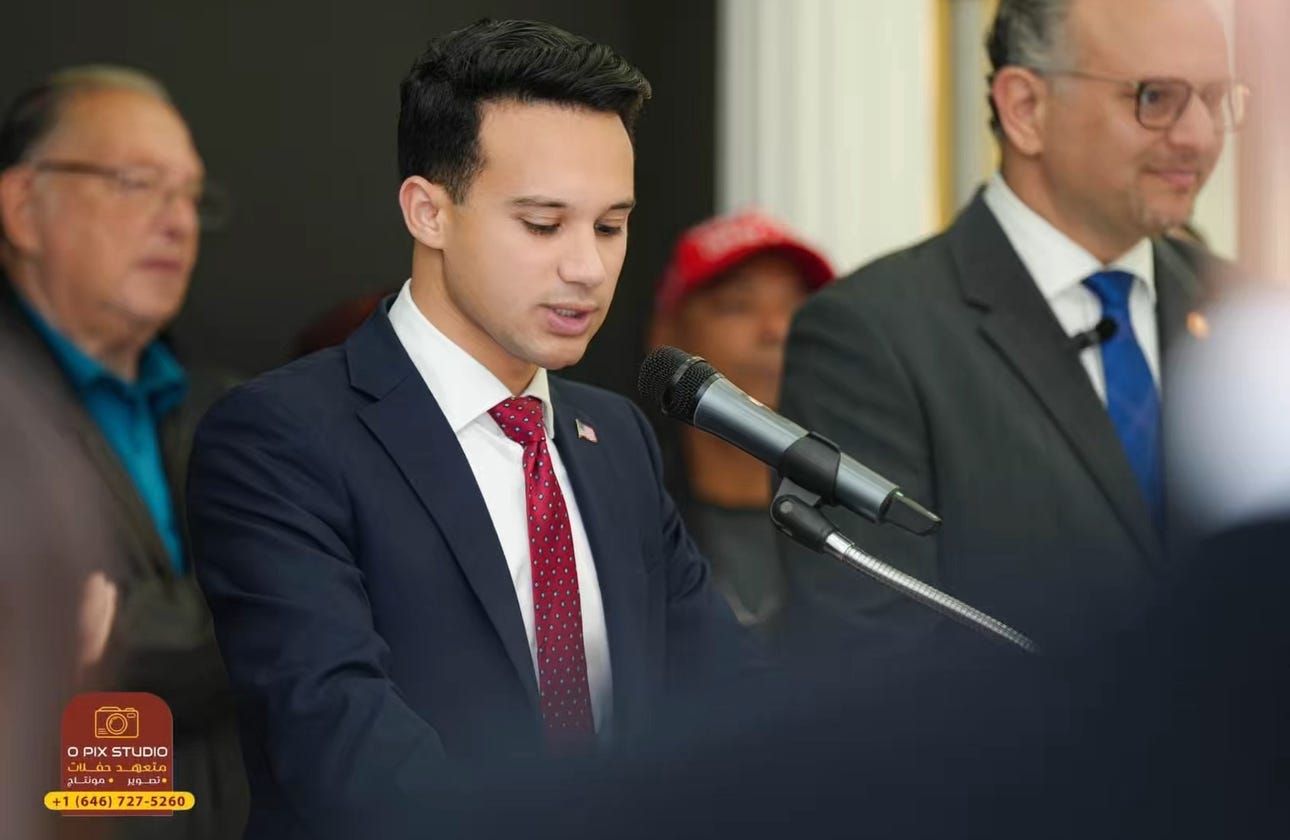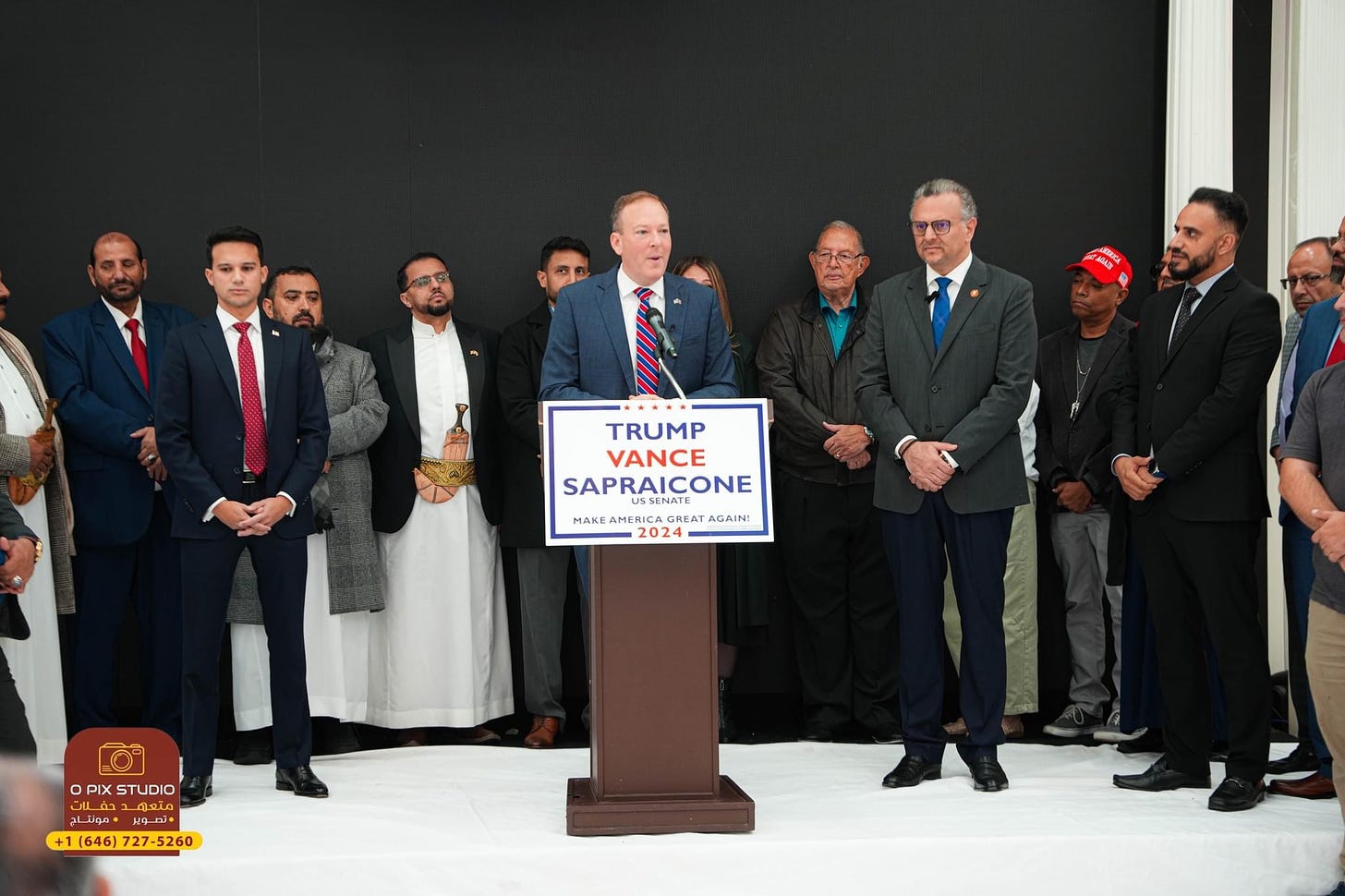NYC Arab American Leaders Endorse Trump
Today Arab-American community leaders endorsed Former President Donald J. Trump in The Bronx burrow of New York City. “We stand at a pivotal moment in our history,” said Karim Elsammak, former NY state senate candidate and professional airline pilot. Standing with local Muslim clerics, community leaders, and Republican Representative Lee Zeldin, Elsammak said, “On behalf of the Arab American community, I stand here to give my full support and endorsement for Donald J. Trump for President of the United States.” Zeldin received the endorsement as a surrogate for the Trump campaign, saying “President Trump is honored to receive, accept, the endorsement from the Arab-American community here in New York City.”

New York is not a swing state, but this endorsement joins with a chorus of others that will reverberate with Arab-Americans nationwide. Elsammak makes the message clear, “To our Arab and Muslim American brothers and sisters, know this, you are fundamental to the American fabric. Your values, faith, family traditions, hard work, and honor are values that resonate deeply with the Republican party.” There are roughly 405,000 Arab-Americans in New York and 3.7 million in total in the United States. The state that this will have the biggest impact is in the key swing state of Michigan, where this demographic makes up 2.1 percent of the population. This voting block will be pivotal in tilting the scale for the State’s 16 electoral votes.

For much of this election cycle, the Arab-Americans have been noncommittal with their vote to either the Democratic or the Republican candidates because of concerns with how they perceive American foreign policy favors the side of Israel in the conflict with Palestine. For many in Michigan, a protest vote for Jill Stein was preferable than a vote for Vice President Kamala Harris or former President Trump. However, in the final days of the election, it appears that the tide is shifting towards Trump.
Karim Elsammak elaborates this shift in the politics of the Arab-American community by observing, “I think in the wake of 9/11, Arab-Americans were kind of a little lost, they weren’t sure which party to join,” adding that, “I think the Democrats after 9/11 were that, but the values didn’t really align. I think right now we’re in a very unique situation given the Trump campaign has been embracing demographics that Republicans traditionally don’t.” According to Elsammak, this open posture towards previously overlooked communities is a core part of the strategy that is remaking the Republican party that is a departure in many ways from what it was preceding the Trump era. Yet that alone would not have been enough. Elsammak says, “I think the pivotal moment was the war in Gaza and Lebanon, I think that was the straw that broke the camel’s back.” Many Arab-Americans have family in the Middle East in regions either already at war or at risk of war. He says that Trump’s record as a peacemaker and his claim that October 7th would not have happened if he were still President instill confidence in his leadership when compared to the Biden-Harris administration. With this political realignment solidifying, Elsammek says, “I think the Arab-American vote will be absolutely crucial in the state of Michigan.”
Massad Boulos, who works alongside the Trump campaign for Arab-American outreach, highlights three reasons for why he thinks this shift is happening. First, on foreign policy, “President Trump is a President of Peace, he is the only President under which no wars were started.” Boulos emphasized the Abraham Accords signed between Israel, the United Arab Emirates (UAE), Bahrain, Sudan, and Morocco. This agreement called for a commitment to peace in the region and was named in honor of Abraham, the patriarch of Judaism, Christianity, and Islam. This deal was to be joined by the Kingdom of Saudi Arabia and a dozen or more other Middle Eastern states but the Biden Administration did not continue the initiative. To Boulos, Arab-Americans now see the contrast between peace and war. Under the current government the US foreign policy record in the Middle East has produced an emboldened Iran and has failed to pressure a resolution to the Israel-Palestine war.
Second, Boulos said that regarding domestic affairs, Arab-Americans are “fed up by the woke ideology that their children are subjected to,” stating that their beliefs inherently align with conservative social values. Finally, the issue of illegal immigration, which he says is “unacceptable to our communities,” saying that Arab-Americans had to follow the law. “We are legally naturalized citizens, and we don’t accept illegal immigration.”
New York Congressman Lee Zeldin echoed these sentiments in remarks he made at the endorsement event. “The Arab-American community is stepping up. They care about our country, they care about peace, they understand that President Trump was somebody who was ending foreign wars instead of starting new ones. And a lot of people across this entire state and country want to get back to that.” When weighing the choices, Vice President Kamala Harris and her stances are unclear. “Kamala Harris meanwhile has been inconsistent, all over the place, flip-flopping, not quite sure of who she is and who she wants to be.” What voters are able to see from Harris’s record serving as Vice President, according to Zeldin, only points toward more economic strain, more illegal immigration, and escalating tensions abroad. In the last week of the race, Democrats and their candidate have resorted to calling Republicans nazis. “Clearly the ‘campaign of Joy’ is with President Trump and his supporters” as he appears lighthearted on the campaign and sticks to his closing message, “are you better off now than you were four years ago?”



